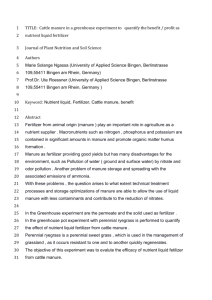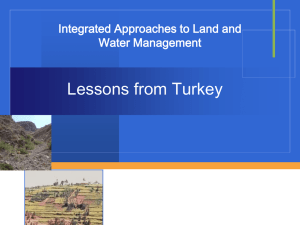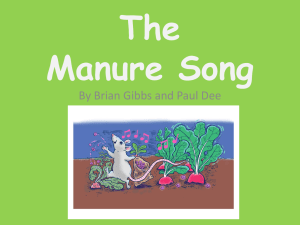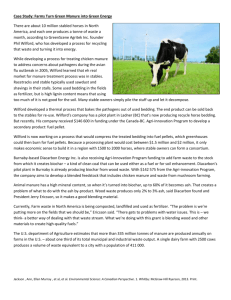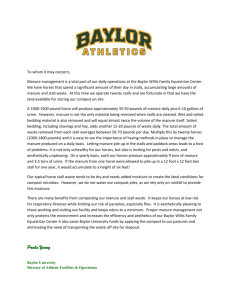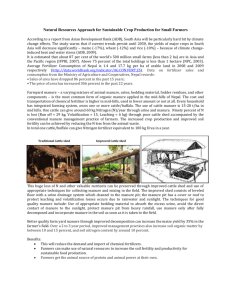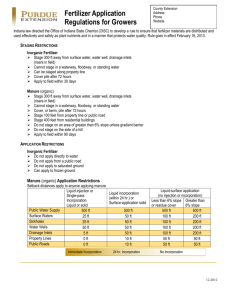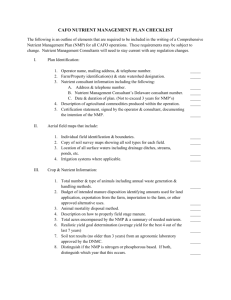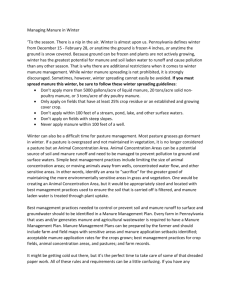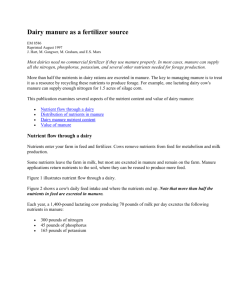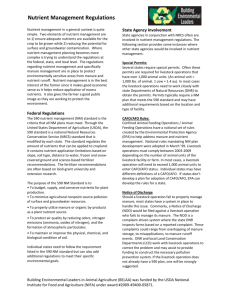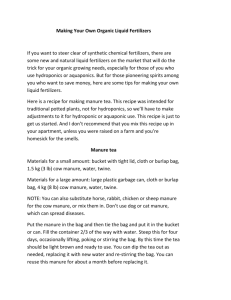Training - ReUseWaste
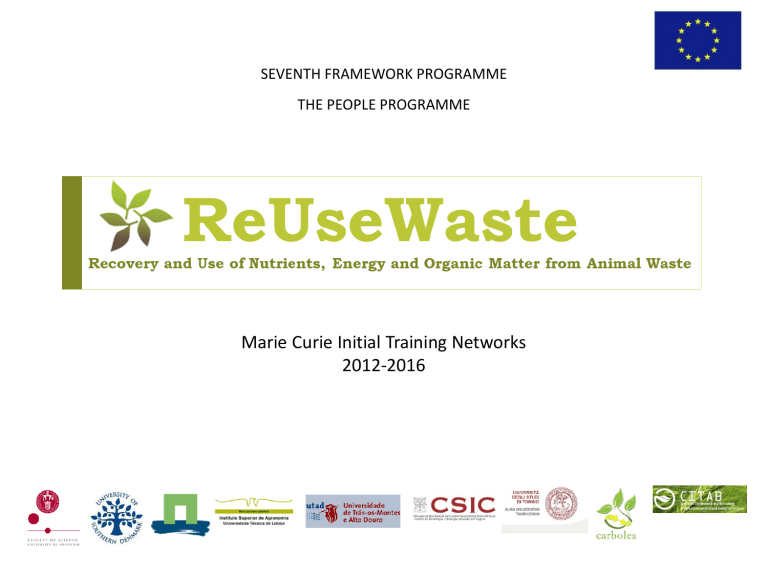
SEVENTH FRAMEWORK PROGRAMME
THE PEOPLE PROGRAMME
Marie Curie Initial Training Networks
2012-2016
ReUseWaste in brief
Project title: ReUseWaste - Recovery and Use of Nutrients, Energy and Organic Matter from Animal Waste
Funding: € 3.24 million over the period 2012-2015
Source: EU FP7 Marie Curie Action programme, under the Initial Training Network call.
Training: 13 young researchers (PhD students and post-docs) will be trained in the project.
Project website: www.reusewaste.eu
Partners: Universities, research institutes, private companies and public authorities from 6 European countries.
Primary partners
University of Copenhagen
University of Southern Denmark, Denmark
Wageningen University, the Netherlands
Instituto Superior de Agronomia, Technical University of Lisbon, Portugal
Univ. Tras-os-Montes & Alto Douro, Portugal
Consejo Superior de Investigaciones Científicas,
Spain
University of Torino, Italy
University of Limerick, Ireland
Associate partners
University Miguel Hernández, Spain
Energy Research Centre, Holland
PTM s.r.l, Italy
Alfa Laval Nakskov A/S, Denmark
Pieralisi Group, Italy
Biomass Heating Solutions Ltd., Ireland
Granja Pedro Guevara, Spain
Bio Systems Europe, UK
Verification Agency for Environmental Technologies in Agricultural Production, Denmark
Regione Piemonte, Italy
Project Background
(a) Manure N input density (b) Topsoil Carbon content
%C kg N/ha
Location of project partners
Soil fertility gradient
Source: JRC: EUR-22334, 2006 and
Soil Atlas of Europe 2008
ReUseWaste objectives
ReUseWaste is a multi-site and multidisciplinary training network, bringing together major EU research groups from leading universities and research institutes, key agri-environmental technology companies and public authorities, from the countries and regions of most intensive livestock production in Europe
The ReUseWaste network will:
• provide new ideas, methods and principles that lead to a major rethink in the current, established animal waste management systems
• train a group of young researchers in developing new technologies for improved and sustainable utilisation of valuable organic matter and plant nutrient resources in animal waste
• provide companies with improved and new technologies to produce both bioenergy and ”green” bio-fertilisers, leading to improved soil, water and air quality
Research concept
Characterisation
• Fractionation
• Thermogravimetry
• Spectroscopy
• Pyrolysis-GC/MS
• ICP/IRMS
• NIR/MIR
• XANES
…but also
Animal waste =
Environmental problems
- Organic Matter
Function
• Energy source
• Crop fertiliser value
• Soil quality amelioration
• Carbon sequestration
Assessment
• System analyses
• Stakeholder analyses
• Life cycle assessment
• Integrated sustainability
Treatment
• Liquid-solids separation
• Acidification/inhibitors
• AD / Biogasification for energy
• Incineration/Gasification/Pyrolysis
• Composting
• Waste upgrading/Nutrient recovery
• Bio-fertilizer production
Utilisation
• Crop field application
• Horticultural growth media
• Landscaping
• Soil remediation
Need for research training
and competence building in all of these
Project structure
Animal waste
13 young researchers
WP4
Technology & management
WP1
Scientific training
WP5 Energy recovery
WP3
OM & nutrients characterisation
WP6 Land recycling
WP0 Project manag.
WP7
Synthesis & assessment
WP2
Generic training
13 scientists trained to develop sustainable animal manure solutions
Organic fertilizers
Bioenergy
Improved environment
Training activities
WP0 Project management & dissemination
Man. & daily adm.
ESR recruitment
ESR Intro worksh.
Network meetings
Joint experiments
Study tours
New PhD courses
1.01 Gas emissions process & meas.
WP1 Scientific training
Existing PhD courses
1.05 Env. tech. for manag. bio-waste
1.09 Soil-plantclimate models
1.02 Bioenergy from animal manure
1.04 Implementation in govern. policies
1.06 Plant nutrients terr. ecosystems
1.08 Adv. analytical techniques.
1.10 Agro-environ. economics
1.03 Appl. membrane technology
1.07 Isotope methods for nutrient dynam.
1.11 Org. residues management
1.12 Life Cycle Ass. in Biol. Prod. Syst.
IPR plan
Dissemination pl.
WP2 Generic and complementary training
2.01 Intro-course for
ReUseWaste PhD
2.02 Project management
2.04 IPR and patenting
2.07 Res. communication & outreach
2.05 Scientific writing
(fundamentals)
2.08 How to write grant proposals
2.03 Phil. science & research ethics
2.06 Scientific writing
(English language)
2.09 Study tours & secondments
International seminar / conference
WP3
OM & nutrients characterisation
• 1 ESR/ER projects
WP4
Technology & management
• 5 ESR/ER projects
WP5
Energy and P recovery
• 3 ESR/ER projects
WP6
Recycling of C & nutrients to land
• 3 ESR projects
WP7
Synthesis & integrat. assess.
• 2 ESR/ER project
ReUseWaste research projects and fellows
3.1. New spectroscopic and thermogravimetric methods for determining manure composition and degradability George Bekiaris (UCPH)
4.1 Development of enhanced mechanical separation efficiency by combined separation techniques, pre- and post-treatment, Olga Popovic (UTO)
4.2 Dev of combined acidification and separation: impact on manure and slurry fractions composition and gas emission, Iria Regueiro (ISA-UTL)
4.3 Development of membrane technology for production of concentrated fertiliser and clean water, Salud
Camilleri Rumbau (SDU)
4.4 Development of composting technology for bio-fertiliser production, André Santos (CSIC)
5.1 Development of anaerobic digestion methods for optimal energy yield and P recovery from animal manure production, Phuong Vu (WU)
5.2 Development of thermal treatment technologies (pyrolysis & gasification) for low moisture and dehydrated manure feedstock, Natalie Taupe (ULIM)
5.3 Optimal combustion technology for on-farm conversion of animal manures to heat and ash, (2013) (ULIM)
6.1 Field application and gas emissions of slurry treated by additives and mechanical separation, Maxwell
Owusu-Twum (UTAD)
6.2 Land utilisation, crop nutrient value and GHG emission of digestate and compost-based biofertilisers,
Raghunath Subedi (UTO)
6.3 Assessment of soil quality effects and nutrient availability of manure ash and biochar based biofertilisers,
Thanos Pantelopoulos (UCPH)
7.1 Integrated assessment of manure management chains, Yong Hou (WU)
7.2 Evaluation of market acceptability of manure derived biofertilizer products, (2013) (UCPH)
Environmental technology companies
PG *
PTM *
BHS *
AL *
Innovative manure treatment solutions
New meas. & monitoring products
KOM*
ECN
Improved energy and nutrient recovery systems
Technology & Innovation
GSR *
Novel biofertilizer products
WP4
Technology & management
WP5 Energy recovery
WP3
OM & nutrients characterisation
WP7
Synthesis & assessment
13 scientists trained to develop sustainable animal manure solutions
Students other projects
Animal waste
UCPH
SDU
14 young researchers
WP1
Scientific training
WP6 Land recycling
International conference
WP2
Generic training
TI *
Public and regulatory authorities
BSE *
Career opportunities
VERA **
RP-DA **
Public-private R&D and extension network for manure recycling technology
SE Asia partners
RAMIRAN
Organic fertilizers
Bioenergy
Better environment
Farmers org.
& advisory
Universities
WU
Training + R&D networks
Joint, mutually recognised doctoral training-program Lasting research collaboration
ISA-UTL
UTAD
UTO
ULI
CSIC/UMH
Dissemination networks
